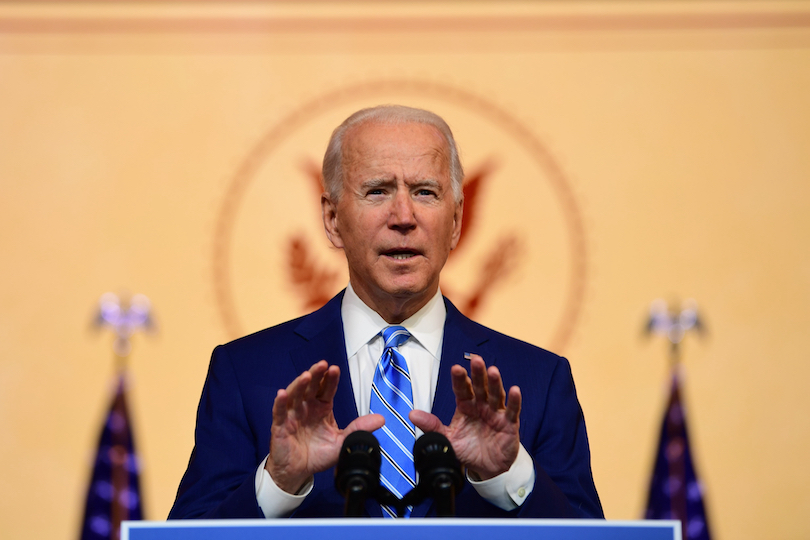On the evening of the US election day, on the opposite aspect of the Pacific, 7,000 miles away from the US, thousands and thousands gazed at their screens, anxiously ready for the current presidential elections’ outcomes. Cheers erupted as anchors and pundits, seeing Trump’s lead in quite a few states, concluded that Trump had gained the election. The exuberance became exasperation shortly. When many left their jobs within the night, most media now proclaimed Joe Biden because the forerunner within the election. Welcome to Taipei, the capital metropolis of Taiwan.
Effectively, completely different from Trump supporters within the US, the general public in Taiwan likes Trump for a completely completely different purpose. All through historical past, the US has been essentially the most essential offshore balancer to assist Taiwan fend off Chinese language aggression. Reminiscences are nonetheless vivid amongst many in Taiwan because the US dispatched two plane carriers into the Taiwan Strait within the Third Taiwan Strait Disaster in 1996. In recent times, maybe for good causes, Taiwan has flown beneath the radar – Chinese language threats of use of drive have all turned out to be low-cost discuss. Because the US busily immersed itself within the Center East theater for spreading democracy, nationwide constructing, and extinguishing terrorism, Taiwan and Asia typically have been not noted of policymakers’ agenda.
In the identical period, China has been steadily amassing its energy as a strategic competitor to the US. US negligence on the Taiwan points permits China to bully Taiwan by the use of blocking the island’s worldwide participation until main strides towards unification with the mainland have been achieved. For instance, the variety of Taiwan diplomatic allies practically halved from 29 in 2000 to fifteen now.
Issues took a dramatic flip when Trump got here into workplace in 2016. All through his presidency, Trump has confirmed to be essentially the most considerably supportive US president for Taiwan in current many years, granted that there’s a debate on whether or not Trump’s intentions to assist Taiwan is transactional. Choices that the Trump administration made – corresponding to answering a telephone name from Taiwan’s president, approving ten main arms gross sales to Taiwan, arranging high-level official visits and bilateral talks, proposing and passing quite a few main pro-Taiwan laws—are unprecedented. Coupled together with his robust anti-China insurance policies, Trump has develop into the most popular American president among the many public in Taiwan in many years. That’s the reason Trump’s failure to acquire a second time period is appeared devastating to many in Taiwan. Residents really feel like the problem of Taiwan will likely be placed on the again burner once more.
As Biden is now President, it’s opportune to debate the potential influence of his administration on Taiwan. Judging from his expertise within the Obama administration, most imagine that prospects for US-Taiwan relations are dim. Nevertheless, most present analyses argue in any other case. Some even go as far as to recommend that Biden could even proceed Trump-style Taiwan coverage in his administration.
Within the spirit of contributing to this dialogue, allow us to elevate a number of factors as an example that potential US-Taiwan relations won’t be as sanguine. For starters, Taiwan might be essentially the most predictable. The Tsai administration enjoys excessive ranges of help. The general public in Taiwan has additionally more and more recognized themselves as Taiwanese. Nevertheless, such an inclination doesn’t translate into help for declaring independence. Mixed, we’re more likely to witness Tsai’s second time period replicating what it has completed within the first time period.
As for the Biden administration, what worries observers is that the administration is solely making an attempt to take up an excessive amount of. In an essay that he wrote this March, Biden’s international coverage aspirations embody ending ceaselessly wars, reinvesting in diplomatic corps, lifting girls and women around the globe, and combating corruption, to call a number of. In comparison with Trump’s international coverage, which focuses extra on Asia and the Center East, Biden doesn’t have a geographic desire, hoping to resume “graduation to NATO, preserve the dedication to Israel’s safety, reinvest in our treaty alliances in Asia, and do extra to combine our buddies in Latin America and Africa into the broader community of democracies.”
It doesn’t take in-depth coaching in diplomacy and worldwide politics to comprehend this plan is unrealistic. Reaching only some of those goals requires Herculean effort. Biden’s intentions to do all is likely to be actual, and if that’s the case, we’re more likely to witness an overstretched United States that may be hamstrung to attain a lot in each objective and, worse, incapable of responding to contingency that requires quick consideration. Overcommitment to worldwide affairs will even cut back the approval of the administration among the many public. COVID-weary People now greater than ever needs a authorities to focus extra on what’s going on inside their nation than overseas.
America that’s omnipresent in numerous areas, additionally reduces its potential to handle and stability China’s rise. The China that Biden faces now’s completely different from the one in 2008. Overcommitment to a plethora of points additional handicaps the administration from doing so successfully. Sadly, the brand new administration nonetheless has not developed a transparent technique to answer China. For instance, in responding to current human rights abuses in Hong Kong, the Biden administration appears haphazard, if not muted, in responding to China’s persevering with challenges to US hegemony and its devastating conduct in destroying human rights and democracy in Hong Kong. Just like China’s human rights abuses of Uyghurs, the US must take a number one position in defending world human rights requirements.
If indecisiveness in responding to China’s behaviors turns into the norm for the brand new administration, it would embolden the CCP to take dangerous actions figuring out that an overstretched US is unlikely to reply successfully. For China, such a situation is opportune to check the waters concerning the US dedication to Taiwan in an armed battle. If rising Chinese language aggression towards Taiwan is unaddressed by the brand new administration, it would ultimately lead China to aim a shock assault figuring out that the US won’t reply as they did in 1996. This won’t be the primary time for China to check the waters. China’s militarization of the South China Sea has additionally confirmed its ambition to maintain difficult the US and worldwide society’s backside line.
If the waters are examined with the PLA launching its navy forces on Taiwan, there will likely be no return to present peaceable however contentious trilateral relations between the US, Taiwan, and China. The cross-Strait battle will end in super casualties on the Taiwan aspect. China may additionally endure drastically, but when the battle leads to a fast victory, the CCP will be capable of justify its prices. The US may have essentially the most to lose right here. Not solely does it lose a strategic ally to stability China, however the incapacity to defend Taiwan in want will even tarnish the US repute amongst its allies.
Shedding Taiwan would more likely to be step one within the hegemonic transition from the USA to China, however there’s a technique to forestall it. Drop overcommitment and proceed to give attention to China’s challenges. Whether or not the US can correctly handle and comprise China’s rise within the close to future will decide not solely the destiny of Taiwan and the regional safety of East Asia but additionally the brand new world order and the way forward for humanity. The maxim much less is extra can even apply to worldwide relations.
Additional Studying on E-Worldwide Relations










